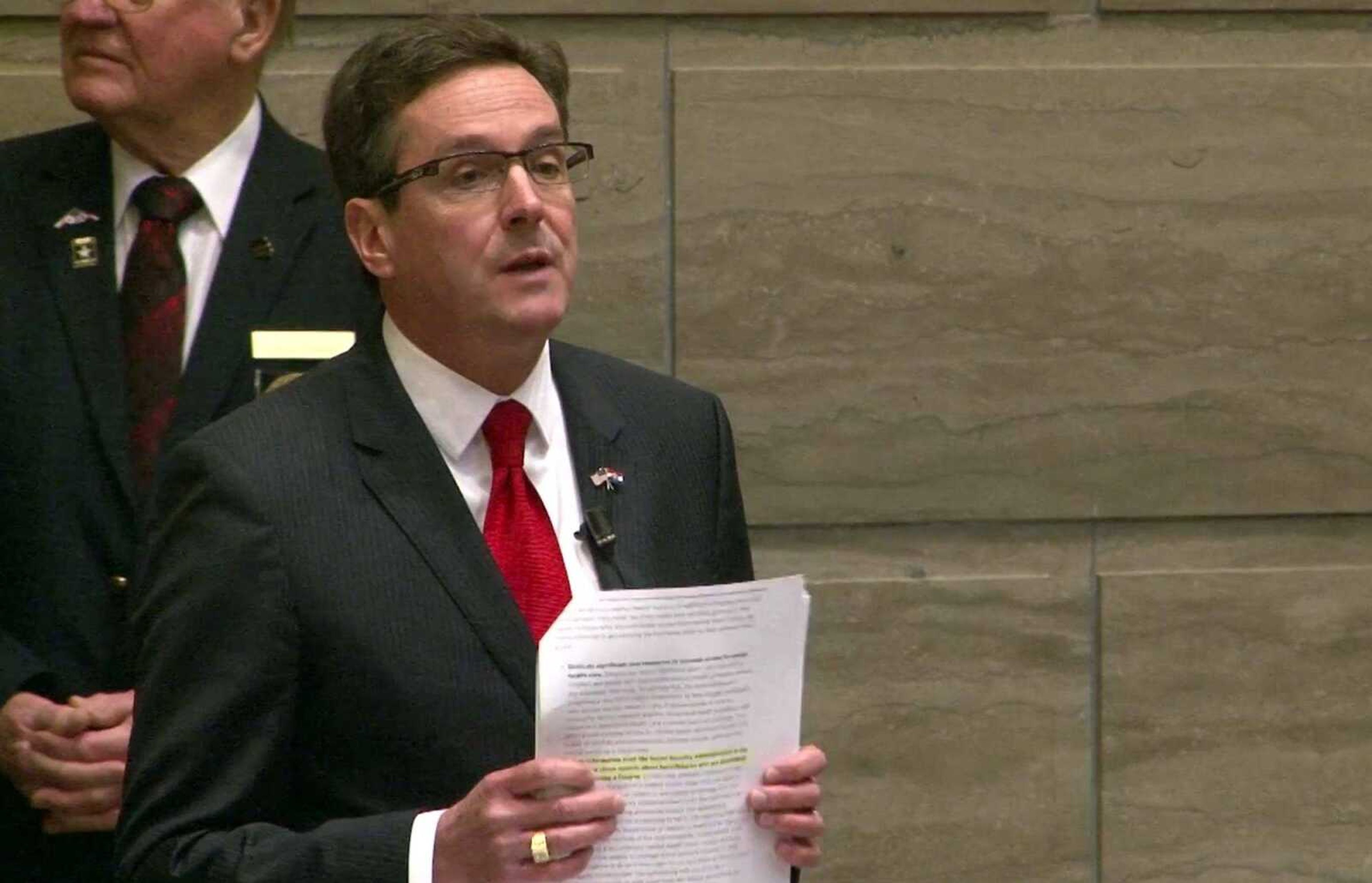Missouri 2016 elections likely to affect state Legislature
JEFFERSON CITY, Mo. -- Within a half-hour of the start of Missouri's 2016 legislative session, Republican Sen. Kurt Schaefer launched into a criticism on the Senate floor of Democratic President Barack Obama's executive order imposing additional gun-control measures...
JEFFERSON CITY, Mo. -- Within a half-hour of the start of Missouri's 2016 legislative session, Republican Sen. Kurt Schaefer launched into a criticism on the Senate floor of Democratic President Barack Obama's executive order imposing additional gun-control measures.
It marked the first of what could be many speeches this session by lawmakers running for higher office.
Schaefer, who faces a Republican primary for attorney general, is one of at least seven legislators campaigning for statewide executive offices or Congress. Several other state House members will be seeking to move up to the Senate in the 2016 elections.
Political scientists say those dynamics likely will lead to an increase in political grandstanding and more high-profile bills -- in some cases measures related to the office the bills' sponsors are seeking -- as lawmakers clamor for public attention.
Before the start of session, Senate President Pro Tem Ron Richard predicted it will be slow-moving with "a lot of speeches." He opted not to speak in depth on the first day of session Wednesday.
"In an election year, there are probably enough speeches on this floor," said Richard, who is not running for higher office. "I thought I'd save the speeches for my distinguished colleagues."
At least five senators are seeking to move up. In addition to Schaefer, Sen. Maria Chappelle-Nadal, a University City Democrat, is running for a St. Louis-area congressional seat; Lee's Summit Republican Sen. Will Kraus is running for secretary of state; Sen. Mike Parson, a Bolivar Republican, is running for lieutenant governor; and Sen. Eric Schmitt, a Glendale Republican, is campaigning for treasurer.
In the House, Rep. Bill Otto, a Maryland Heights Democrat, is running for another St. Louis-area congressional seat, and Rep. Tommie Pierson, a St. Louis Democrat, is running for lieutenant governor.
University of Central Missouri political scientist Robynn Kuhlmann said lawmakers seeking higher office often try to beef up their name recognition, which can be essential in winning elections.
"It definitely behooves lawmakers to get their name out there," she said.
Kuhlmann cited Chappelle-Nadal's activity on Twitter, where she's been calling for action after the fatal police shooting of black 18-year-old Michael Brown in Ferguson in 2014 and for more to be done on buried nuclear waste in the St. Louis area. Chappelle-Nadal said her work as a lawmaker is related to her campaign, because what she described as lack of attention to those issues during her time as a state lawmaker was what pushed her to run for Congress.
Schaefer in particular has come under fire from those who say he has made high-profile moves, such as his work while leading a legislative investigation of abortion practices, to bolster his candidacy.
Democratic House Minority Leader Jake Hummel on the first day of the session also said Schaefer's calls for two University of Missouri employees to be fired were politically motivated. The school has come under widespread scrutiny after student protests over the perceived indifference by former administrators to racial discrimination on campus and in response to a confrontation between two employees and reporters during protests.
"One man's quest for attorney general should not dictate how the University of Missouri operates in any way, shape or form," Hummel said during a news conference Wednesday.
Schaefer described Hummel as a "Democrat operative" and said his comments were unsurprising because Democrats don't support holding the university accountable on issues such as a professor's actions during student protests or practices at Planned Parenthood.
Truman State University political scientist Randy Hagerty said lawmakers running for higher office may be apt to take on more high-profile legislation.
"That's not to say that their natural political inclinations don't lean in that direction to begin with," Hagerty said. But "maybe they'll put just a little more focus on those issues that appeal to some of the key interest groups and some of the key demographics that they need."
Kraus, a secretary of state candidate, is sponsoring a bill to require voters to present photo identification at the polls, with some exceptions. The secretary of state supervises elections. He has voted in favor of similar legislation in the past and introduced measures to allow for photo identification before he announced his candidacy. He also mentioned his support for the requirement when he made his announcement in July 2014.
Schmitt this year introduced a measure that would ban the state from investing in companies with active operations in countries designated as state sponsors of terrorism. The treasurer is responsible for state investments.
Schmitt said while the legislation relates to the treasurer's office, it's one of a number of bills he has filed during his time as senator that deal with the responsibilities of a state office. Schmitt said he proposed the legislation in response to the Iran nuclear deal.
The state primary elections are Aug. 2. The general election is Nov. 8.
Connect with the Southeast Missourian Newsroom:
For corrections to this story or other insights for the editor, click here. To submit a letter to the editor, click here. To learn about the Southeast Missourian’s AI Policy, click here.









